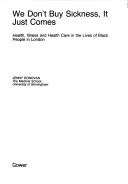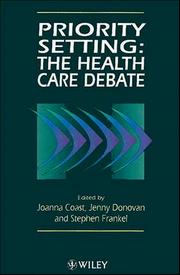| Listing 1 - 5 of 5 |
Sort by
|
Book
ISBN: 0643106472 9780643106475 9780643106482 0643106480 9780643106468 0643106464 Year: 2013 Publisher: Collingwood, VIC
Abstract | Keywords | Export | Availability | Bookmark
 Loading...
Loading...Choose an application
- Reference Manager
- EndNote
- RefWorks (Direct export to RefWorks)
Designing to Heal explores what happens to communities that have suffered disasters, either natural or man-made, and what planners and urban designers can do to give the affected communities the best possible chance of recovery. It examines the relationship that people have with their surroundings and the profound disruption to people's lives that can occur when that relationship is violently changed; when the familiar settings for their lives are destroyed and family, friends and neighbours are displaced, incapacitated or killed. The book offers a model of the healing process, outlining the e
Architecture and society. --- Architecture --- Environmental psychology. --- Dwellings --- Buildings --- Environmental engineering (Buildings) --- Environmental engineering --- Sanitary engineering --- Domiciles --- Homes --- Houses --- One-family houses --- Residences --- Residential buildings --- Single-family homes --- Architecture, Domestic --- House-raising parties --- Household ecology --- Housing --- Environmental psychology --- Cognitive ergonomics --- Ecological psychology --- Ecopsychology --- Ecotherapy --- Environmental quality --- Environmental social sciences --- Human factors science --- Psychoeology --- Psychology --- Psychotherapy --- Ecological Systems Theory --- Human factors in architecture --- Human engineering --- Architecture and society --- Architecture and sociology --- Society and architecture --- Sociology and architecture --- Human factors. --- Psychological aspects. --- Environmental aspects. --- Environmental engineering. --- Human factors --- Psychological aspects --- Social aspects

ISBN: 0566052016 Year: 1986 Publisher: Aldershot Gower
Abstract | Keywords | Export | Availability | Bookmark
 Loading...
Loading...Choose an application
- Reference Manager
- EndNote
- RefWorks (Direct export to RefWorks)
Book
ISBN: 104005241X 0429323557 Year: 2024 Publisher: Routledge
Abstract | Keywords | Export | Availability | Bookmark
 Loading...
Loading...Choose an application
- Reference Manager
- EndNote
- RefWorks (Direct export to RefWorks)

ISBN: 0471961027 Year: 1996 Publisher: Chichester New York Brisbane Wiley
Abstract | Keywords | Export | Availability | Bookmark
 Loading...
Loading...Choose an application
- Reference Manager
- EndNote
- RefWorks (Direct export to RefWorks)
Droit aux soins de santé --- Etat et médicine --- Geneeskunde en staat --- Geneeskunde--Overheidsbeleid --- Geneeskunde--Regeringspolitiek --- Gezondheidsbeleid --- Gezondheidszorg--Oordeelkundig gebruik --- Gezondheidszorg--Overheidsbeleid --- Gezondheidszorg--Regeringspolitiek --- Health care rationing --- Health policy --- Health resources rationing --- Medical care rationing --- Medical care--Government policy --- Medical policy --- Medicine and state --- Médecine--Politique gouvernementale --- Médicine et état --- Policy [Medical ] --- Politique de santé --- Politique médicale --- Politique sanitaire --- Protection sanitaire --- Public health--Government policy --- Rationing of health care --- Rationing of medical care --- Recht op gezondheidszorg --- Right to health care --- Santé [Politique de ] --- Santé publique--Politique gouvernementale --- Soins de santé--Usage rationnel --- Soins médicaux--Politique gouvernementale --- Staat en geneeskunde --- State and medicine --- #GBIB:CBMER --- Right to health --- Health care, Right to --- Health, Right to --- Medical care, Right to --- Right to medical care --- Social rights --- Health care policy --- Medical care --- Policy, Medical --- Public health --- Public health policy --- Science and state --- Social policy --- Medical economics --- Rationing --- Citizen participation --- Government policy --- Great Britain --- Medical policy - Great Britain - Citizen participation.
Book
ISBN: 3030488225 3030488217 Year: 2020 Publisher: Cham, Switzerland : Palgrave Macmillan,
Abstract | Keywords | Export | Availability | Bookmark
 Loading...
Loading...Choose an application
- Reference Manager
- EndNote
- RefWorks (Direct export to RefWorks)
This book explores how teachers can navigate the complex process of managing change within the classroom. The chapters highlight the new challenges that have arisen with the emergence and introduction of educational technology as teachers find themselves having to be responsive to the needs and demands of multiple stakeholders. Traversing a range of conceptual, disciplinary and methodological boundaries, the editors and contributors investigate the tensions that impinge on research-based change and how to integrate directed changes into their education system and classroom. Subsequently, this volume argues that posing these questions leads to increased understanding of the possible long term effects of educational change, and how teachers can know whether their solutions are effective. Jenny Donovan is Lecturer in Science Education and in Writing Doctoral Literature Reviews in the School of Education at the University of Southern Queensland, Australia. Her research focuses on the motivation and capacity primary children have to explore and learn about the 'big ideas' of science such as atomic-molecular theory, and genes and DNA. Karen A. Trimmer is Professor of Educational Leadership at the University of Southern Queensland, Australia. Her research interests include decision-making by school principals, policy and governance, social justice impacts of policy, Indigenous participation in higher education and political pressures on rigorous and ethical research. Nick Flegg was Lecturer in Mathematics Education at the University of Southern Queensland, Australia. His research interests include exploring the concept of Mathematics Anxiety in school children. .
Curriculums (Courses of study). --- Education—Curricula. --- Schools. --- Educational policy. --- Education and state. --- Curriculum Studies. --- Schools and Schooling. --- Educational Policy and Politics. --- Education --- Education policy --- Educational policy --- State and education --- Social policy --- Endowment of research --- Public institutions --- Core curriculum --- Courses of study --- Curricula (Courses of study) --- Curriculums (Courses of study) --- Schools --- Study, Courses of --- Instructional systems --- Government policy --- Curricula --- Curriculum change. --- Teacher participation in curriculum planning. --- Classroom management. --- Curriculum planning --- Curriculum reform --- Instructional change --- Reform, Curriculum --- School discipline --- School management and organization --- Teaching
| Listing 1 - 5 of 5 |
Sort by
|

 Search
Search Feedback
Feedback About UniCat
About UniCat  Help
Help News
News